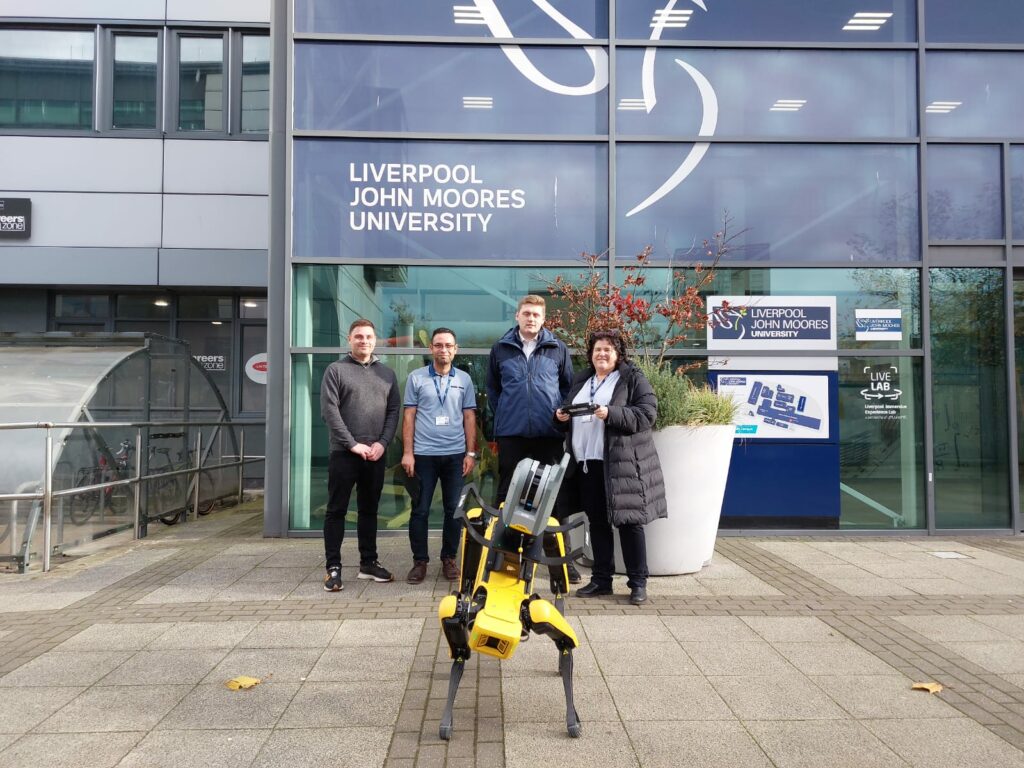Investing £150K into cutting edge educational tools, The School of Civil Engineering and Built Environment at Liverpool John Moores University is the first in Europe to make use of ‘Spot’ the robot dog to revolutionise their teaching and research.
It might have four legs and love a walk but you won’t find ‘Spot’ barking or looking for cuddles. That’s because it’s an all-terrain robotic dog that is being used to streamline civil engineering and construction surveys.
LJMU bought Spot from and is fully supported by BuildingPoint UK and Ireland – the construction arm of Liverpool-based mapping and surveying equipment specialists, KOREC Group.
However, it was actually designed and developed by American robotic company Boston Dynamics. It also features a 3D Laser Scanner by Trimble.
Between them, Trimble and Boston Dynamics have created an agile, easy-to-use four-legged robot. Perfect for accessing areas that are difficult or unsafe.
It can be pre-programmed or remotely controlled which means it can be used to quarry out surveys in the most hazardous conditions. It can even be controlled by workers who aren’t onsite.
It can also be used to carry out repetitive survey tasks, so skilled surveyors are free to do more technical jobs.
How is ‘Spot’ changing the way the department works?
“LJMU is really at the forefront of what is happening within the construction industry which is currently undergoing a digital revolution. Not only is Spot an important addition to construction sites from a health and safety perspective but also a significant reminder that if the construction industry is to overcome a skills and labour shortage, then this is just the sort of technology to attract a new, motivated generation of engineering surveyors.
Spot is presently active on several construction sites following investment by major construction companies so for LJMU to already be preparing the next generation of engineers in this way will be of considerable importance for the industry as a whole.”
– Sam Hough, BuildingPoint UK and Ireland Business Manager

“We’ve been excited about Spot for a very long time, so we’re pleased that we now have our robot dog up and running. It’s a great plus for our students that they will be familiar with this technology before they go full-time into the industry, and we look forward to further exploring Spot’s capabilities and options for different payloads.”
– Dr Fiona Borthwick, Interim Subject Head of Civil Engineering and Built Environment

Who are KOREC and BuildingPoint UK & Ireland?
Established Trimble Geospatial Distributor, KOREC Group, is one of the largest and most successful in the world and has been for over 25 years. They’ve been active in the construction market since they were formed in the 1960’s.
In 2019, the Trimble construction side of the KOREC Group started operating as KOREC Construction. Then in September 2022, BuildingPoint UK & Ireland joined the global BuildingPoint network.
This network supports the entire collection of Trimble Buildings’ solutions to markets around the world. They help construction companies to be more productive, stick to schedules and keep on budget. They even improve collaboration by improving coordination and project transparency.
Who is LJMU School of Civil Engineering and Built Environment?
The School of Civil Engineering and Built Environment at Liverpool John Moores embraces bright and creative thinkers, offering them accredited academic courses as part of a vibrant community. Thanks to its expert staff and committed students, the school has a history of remarkable research, first-rate facilities and strong links with industry leaders too.
Both their undergraduate and postgraduate programmes have impressive employability rates. The school also supports a large number of postgraduate researchers as they complete projects across a range of subjects.
The school is internationally recognised and runs programmes in conjunction with partners based in Malaysia, Qatar, Sri Lanka, Singapore and Hong Kong.


Write a Comment